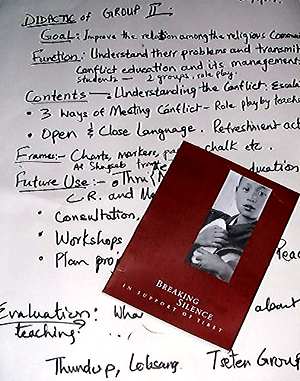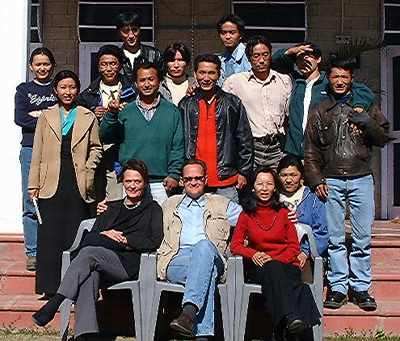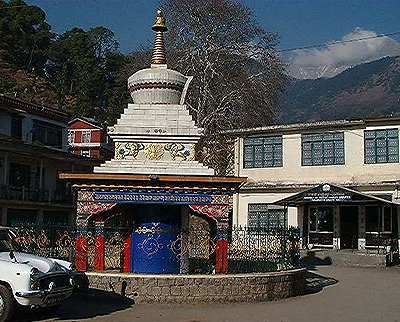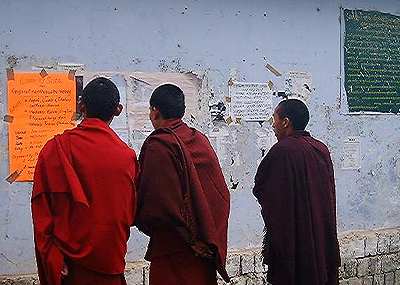|
TIBETAN
CENTRE
FOR
CONFLICT
RESOLUTION, T.C.C.R.
INAUGURATED
March 14, 2002

Flip-over notes from training
course for the Tibetan youth
Tibetan Centre For Conflict
Resolution, TCCR
Nangsi Rest House
Dharamsala -176215.
Distt. Kangra, (H.P.) India.
Telephone : 01892-26627
Inauguration
message
Tibetan Centre for Conflict Resolution (TCCR) is a
non-profitable, educational organisation dedicated to the
non-violent management of conflicts in the Tibetan
Community and the world as a whole.
Tibetan Centre for
Conflict Resolution Aims :
To promote the approaches and tools of non-violent
conflict resolution and democratic processes in our
Tibetan community in exile and elsewhere. Thus
strengthening our unity, which, in turn ensures the
continuance of our non-violent struggle in the long
run.
We Believe That
:
Conflicts are
challenges
Conflicts are life's challenges to us. As His Holiness
the Dalai Lama said during a private audience to us, "As
long as there is human Society, there will always be
conflicts. As I always say that if we do not want
conflicts at all we have to make the entire humanity
stupid or dull, and then there will be no problems at
all." Therefore conflicts are an inevitable part of any
change and potential development. Conflicts can lead to
hostility and stagnation or they can lead to social
progress and better understanding. It depends entirely on
how people cope with conflicts.

The Tibetan youth we trained
and who celebrated the inauguration of TCCR on March 14,
2002. Left on first row, TFF associate Else Hammerich,
the Danish Centre for Conflict-Resolution who is chief
responsible for the training
Conflicts can transform
Conflicts should not necessarily be prevented. If
conflicts are managed using the tools of non-violent
conflict resolution, they may lead to progress in
relations and a more comfortable and transparent
environment. The axiom of non-violent conflict resolution
is to deal with conflicts in ways that lead to personal
and social transformation, to transform conflicts into
creative energy.
Our Main Activities
:
- Building up TCCR into a viable Tibetan NGO.
- Educating different groups of people by giving
workshops.
- Organising Seminars.
- Training of new trainers.
- Mediating between individuals and groups who face
problems and wish to make use of us.
- Promoting public dialogue.
- Fact finding into problems in the Society.
- Integrating the known approaches to conflict
resolution with Buddhist philosophy and Tibetan
culture in order to evolve a new perspective.
We are available to those who require our
assistance.

Government Square in McLeod,
the centre of the Tibetan exile government
Founding Data
:
The idea of setting up a centre for conflict
resolution in our community took root in1996 when Mrs.
Else Hammerich, the founder of the Danish Centre for
Conflict Resolution met His Holiness the Dalai Lama at
Copenhagen in Denmark.
The project was carried out by the DCCR in partnership
with the Home Department of our Government in exile, with
financial aid from the Danish Foreign Ministry
(DANIDA).
Mrs. Else Hammerich and Mr. Bjarne Vestergaard from
the DCCR, came to India to work on this Project. They
trained sixteen young trainees in conflict resolution and
democratic processes. The intensive training spanning
over a period of six months reached completion
successfully in April 2001. The TCCR office started
functioning wef. 1st of May 2001.
People Working at the
Centre :
Three employees designated as co-ordinators, and
thirteen other well-trained members together form the
core group of the centre. The three co-ordinators are
responsible for the functioning of the TCCR office and
it's various activities, with the help of the other
members.
For the first two years the TCCR will be under the
wings of the Home Department of the CTA and financially
linked to DANIDA. During this period, for smooth
functioning, the centre has an administrative board
comprising of the Minister, the Secretary, and the Joint
Secretary of the Home Department and the three
co-ordinators.
The Logo of the centre
:
The logo of TCCR consists of a triangle, each corner
of it represents the conflicting points of view. They are
joined together by mutual co-operation and clear
communication carried out in a compassionate way. This,
then results in the non-violent resolution of conflicts
and a harmonious environment represented by the popular
Tibetan symbol of the Four Harmonious Friends at the
centre of the logo.
Conflict Resolution And
Buddhist Philosophy:
TCCR highlights the importance of Tibetan Buddhism,
Tibetan culture and traditions and tries to blend it with
Western approaches so that the outcome is a genuine and
most appropriate set of tools and skills for our
community.
©
TFF & the author 2002

Tibetan monks in
Dharamsala

Tell a friend about this article
Send to:
From:
Message and your name
|